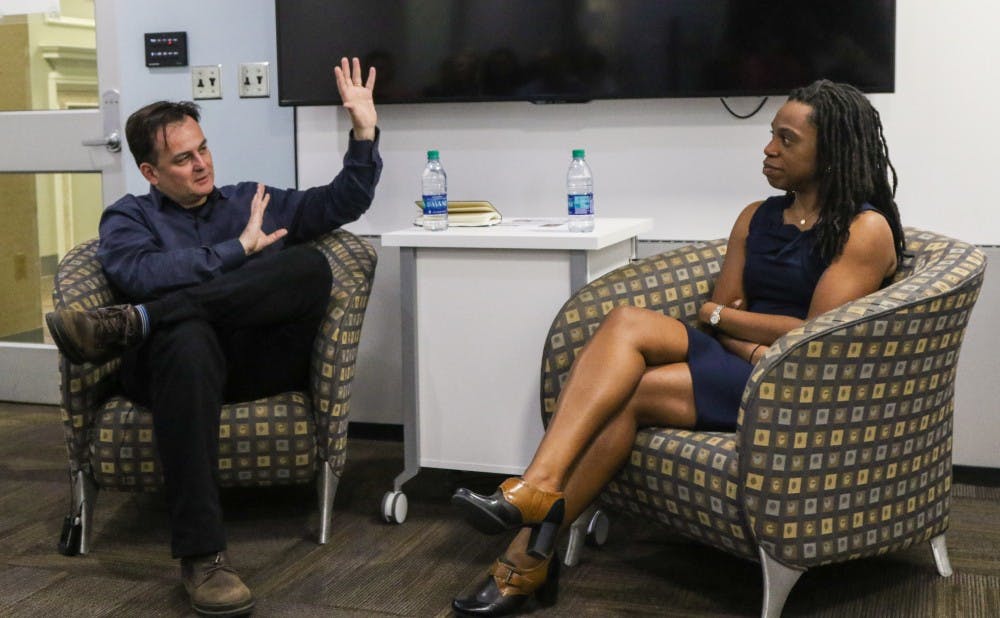A breast-cancer surgeon and a romance studies professor walk into a room. There, over rosé and vegetarian sushi, they discuss their childhoods, their career stories, their thoughts on race in America and their shared history of immigration.
Such was the scene at Thursday’s installment of “Doctors Are In,” the new talk show-like series sponsored by the Health Humanities Lab and the Franklin Humanities Institute, which invites humanities and health-care faculty to debate mutual interests.
This month, the guests were Laurent Dubois, a professor of romance studies who specializes in Haitian history, and Oluwadamilola Fayanju, surgical oncologist and assistant professor of surgery.
During the talk, Fayanju spoke about the struggles of being a female African immigrant in medicine—struggles that began during her childhood. Born in Nigeria, she moved to Dayton, Ohio where she led a “very lonely existence” as one of the few Africans in her town, she said. She later moved to Verona, N.J. where she was one of only two black people in her graduating class.
“When a patient from a rural area says their town doctor is Nigerian, I always think, ‘Oh, that poor soul,’” Fayanju said. “Their mom and dad may have thought moving to rural Montana was a great opportunity, but I always think to myself, ‘How is their kid doing?’”
Although her own parents achieved high ambitions as professional consultants, Fayanju said that most immigrant families follow a predictable and stereotypical script, where the parents work menial jobs so that their second-generation children may become doctors and dentists.
“Many immigrants think of medicine as this prejudice-free route to prosperity and respect, but that’s not always the case,” she said. “I’m frankly waiting for the Me Too movement to happen in medicine.”
Dubois provided a contrasting story to that of Fayanju.
“For my parents, medicine was a route to the United States. And for my grandfather, who was from a very small rural village, the route into respectability and social mobility was medicine,” Dubois said. “There is a sense of the dignity of the doctor.”
Although Dubois is not a doctor himself like others in his family are, he said the issues of medicine intersected often with his Caribbean research.
“My very first move into Caribbean studies was the AIDS epidemic in the 1980s,” Dubois said. “My first research paper in Princeton asked, ‘What is it about the way Haitians are viewed in this country that it was so easy for people to blame Haitians for the disease?’”
Fayanju, who holds a bachelor’s degree in history and science and a master’s in comparative literature, saw a different overlap between medicine and the humanities. When asked by Kearsley Stewart, professor of the practice of global health, whether her humanities training was relevant to her surgical career, Fayanju said it helped her communication skills.
“I can explain medical stuff in a way that my patients understand,” Fayanju said. “And my patients appreciate that.”
Fielding questions from audience members, the panelists briefly discussed topics as varied as American healthcare, voodoo healing, dealing with death and the role of sexism in many late-stage diagnoses.
At one point, Dubois asked Fayanju about her favorite part of doing surgery, and she replied that it is the intimacy of operating on a patient.
“Every person you’ve ever put a scar on, every complication you’ve ever had, that belongs to you, and you feel it forever,” Fayanju said. “It’s a powerful connection.”
Get The Chronicle straight to your inbox
Signup for our weekly newsletter. Cancel at any time.

